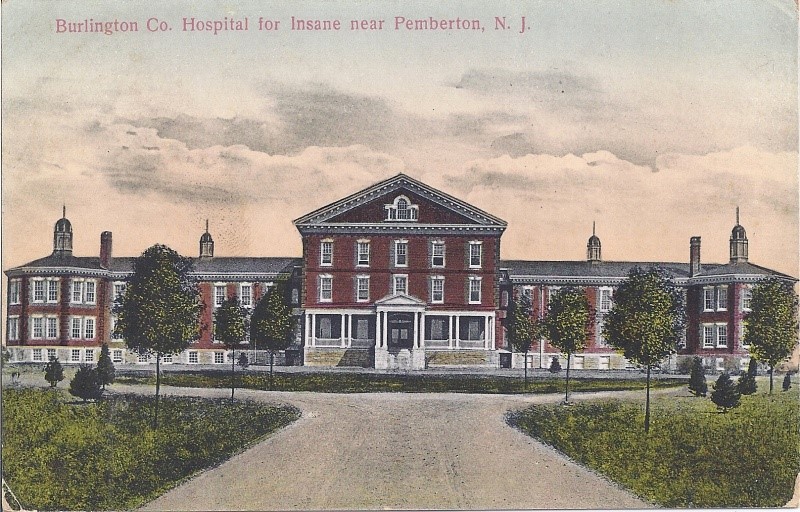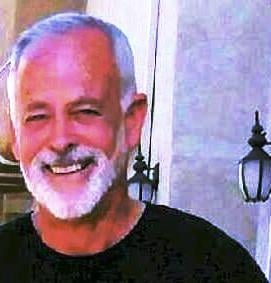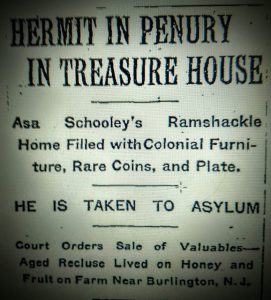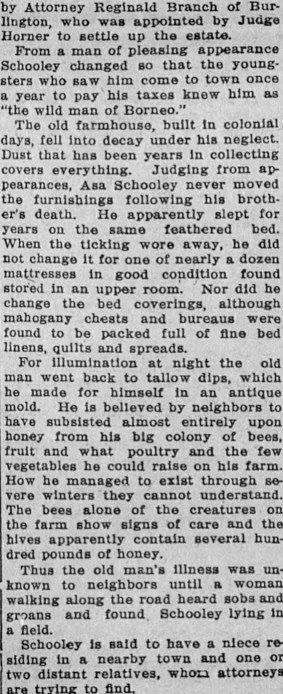 Burlington County Hospital for the Insane, Pemberton Township, Community of New Lisbon, New Jersey. Courtesy of westjerseyhistory.org
Burlington County Hospital for the Insane, Pemberton Township, Community of New Lisbon, New Jersey. Courtesy of westjerseyhistory.org
His name, Asa Schooley, seemed to jump out at me. It was a name I hadn’t been searching for, but there he was in black and white newsprint, clinging to his little spot on the back page of time.[1] The details of how I got to Asa in the first place probably aren’t all that important, but suffice it to say I’d started out looking for someone else’s obituary – that of another Mr. Schooley.[2] But like the rest of us I’d found myself stumbling upon a “rabbit hole,” this particular one belonging to Asa. (I’m a bit embarrassed to tell you that I never did find the obit. I had been looking for.) Asa’s sad life, lacerated with circumstance, caught me off guard, prompting me to look further for facts and answers – a search with still much left to uncover.
Asa, a cousin to my great-great-grandmother Hester (Schooley) Record,[3] was the son of Asa Schooley Sr. (ca. 1801–1883) and his wife Susan (Ivins) Schooley (ca. 1801–ca. 1875). Asa, his parents, a brother Joseph, and three sisters lived in what has been described as “a ramshackle an old country house” in Florence, Burlington County, New Jersey. Here the Schooley family maintained a farm along a highway running between Philadelphia and New York.[4]
Asa’s family, prosperous at one time, seems to have undergone a natural sort of attrition after Asa’s parents passed away. Asa’s sisters married, and in 1897 all three sisters passed away within a few short months of one another. By 1900, Asa and his brother Joseph were alone at the farm with one surviving niece, Hannah, but even this wouldn’t last.
 Contemporaries described Asa Jr. as one of Burlington County’s “Beau Brummells.”[5] However, the handsome looks of the Schooley boys don’t seem to have done either Asa or his brother Joseph much good, as they are further described as having been “unlucky in love” – so unlucky that they became isolated and alone from the rest of the world. Asa however gets the worst of it, losing his brother Joseph to death in 1901 and his niece Hannah (Telley) Freeman to marriage that next year. By 1902 Asa is isolated, clinging to memories – and a tenuous sanity.
Contemporaries described Asa Jr. as one of Burlington County’s “Beau Brummells.”[5] However, the handsome looks of the Schooley boys don’t seem to have done either Asa or his brother Joseph much good, as they are further described as having been “unlucky in love” – so unlucky that they became isolated and alone from the rest of the world. Asa however gets the worst of it, losing his brother Joseph to death in 1901 and his niece Hannah (Telley) Freeman to marriage that next year. By 1902 Asa is isolated, clinging to memories – and a tenuous sanity.
Asa’s life, his encroaching disabilities, and the reasons behind his growing periods of isolation between 1901 and his demise in 1912 have been difficult to ascertain. One starting point in the reduction in Asa’s mental health is the report that he battled with local authorities about relinquishing his brother Joseph’s body for burial. This first mentioned “trigger event” gives a murky snapshot of Asa’s mental health at the start of 1902.
Another account of Asa’s behavior during this time period comes from the local children. The children became “wide eyed” by his “strange appearance” on visits to town to pay his taxes, labeling him “the wild man of Borneo.” The local people said that during this time he had little interaction with anyone else and never purchased any goods or supplies for the house or farm.
By 1912, as hard as it is to believe, accounts of his life indicate that none of the locals remembered that he was still living at the farm – few (save the tax man or census taker) knew of anyone living there. It is interesting to me that in the span of ten years or so, Asa managed to hide himself away from the rest of the world – and the world let him do so – allowing Asa’s isolation to carry him well past average eccentricity.
Asa continued to live in the old house subsisting on wild honey and what vegetables he was able to grow. It wasn’t until one day in 1912, when Asa’s cries for help were heard on a Burlington highway by a woman passing by, that things would change. Asa, ill and in need of medical care, had managed to drag himself through the undergrowth and out to the road. The locals finally noticed Asa, who was in desperate need of help. By then it was thought his condition was too deteriorated for him to make any sort of recovery or return to normal life. Presumably, this caused county administrators to believe that they had no choice but to exile Asa Schooley to an asylum.
I’m not entirely sure that anyone ever actually tried to help Asa – to help him climb out of what must have been a difficult mental illness. Asa’s house and farm were reported to be quite valuable (almost a time capsule), containing many coins and untouched antiques. It might have simply been easier to seize Asa Schooley’s assets (when Asa needed them most) and give him over to the state – in preference to providing private medical care to get him back on his feet.
Asa Schooley looks to have died intestate in the New Jersey asylum at New Lisbon later in 1912, though the exact “when” of it all is vague. (I am still looking for a record of his death and his final resting place.) I am reminded that in today’s world, Asa might prove to be anyone suffering from mental illness that we might “not see” as we make our way down our own highways; he is someone who, at first glance, we might discount for any number of reasons. This “Hermit’s Tale,” one of isolation and mental illness in the midst of a family’s wealth and history, makes me realize how much more we have to learn and understand regarding diseases like Asa’s – indeed, how very far we have yet to go. Rest in peace, Asa – a peace you well deserve.
Notes
[1] Asa Schooley Jr. (ca. 1843–ca. 1912).
[2] Judge Levi A. Schooley (1841–1908).
[3] Hester Ann (Schooley) Record (1860–1942).
[4] Aurora Democrat, Aurora, Colorado, 16 August 1912.
[5] The New York Times, 14 July 1912.
Share this:

About Jeff Record
Jeff Record received a B.A. degree in Philosophy from Santa Clara University, and works as a teaching assistant with special needs children at a local school. He recently co-authored with Christopher C. Child, “William and Lydia (Swift) Young of Windham, Connecticut: A John Howland and Richard Warren Line,” for the Mayflower Descendant. Jeff enjoys helping his ancestors complete their unfinished business, and successfully petitioned the Secretary of the Army to overturn a 150 year old dishonorable Civil War discharge. A former Elder with the Mother Lode Colony of Mayflower Descendants in the State of California, Jeff and his wife currently live with their Golden Retriever near California’s Gold Country where he continues to explore, discover, and research family history.View all posts by Jeff Record →

